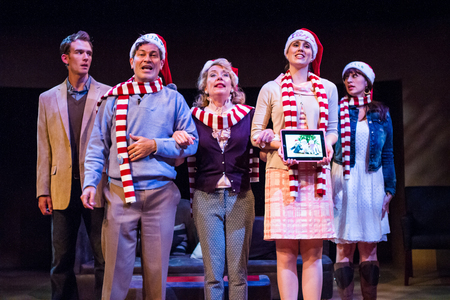'Miles and Ellie' at the Purple Rose gets laughs, if not your heart
Note: This review is based on Thursday's final preview performance.
What did you think of the play? Leave a comment and / or vote in the poll at the end of this post:

Rusty Mewha, Bill Simmons, Michelle Mountain, Cheryl Turski and Rhiannon Ragland in "Miles and Ellie" at the Purple Rose.
photo by Sean Carter Photography | courtesy of the Purple Rose Theatre Co.
The play opens in 1991, when adolescent Ellie (Rhiannon Ragland), all overalls and braids, is paired with long-haired high school classmate Miles (Rusty Mewha) for a health class project. As the two care for a sack of flour, pretending it’s a baby, they fall in love. But the way is not smooth - the presence of Ellie’s bold and flirty sister Illyana (Cheryl Turski) and Senate candidate father (Bill Simmons) certainly doesn’t help - and when there’s a misunderstanding, the teen couple breaks up.
The play’s second act is set 20 years later, as Ellie returns home, post-divorce, for Thanksgiving. Her mother (Michelle Mountain) soon announces that she ran into Miles earlier in the day and invited him to the family’s dinner, setting the stage for an uncomfortable reunion.
There’s a lot of winking at the audience throughout the play - from the cute but extraneous preface (wherein Illyana coaches Ellie through a choreographed Madonna number), to Miles and Ellie’s “love montage” at a fair, to the cartoonish depiction of Ellie’s politically conservative dad - and the inevitable consequence of this is that the characters never feel wholly real.
One problem, of course, is that it’s really, really difficult to pack everything you need into this kind of story; in the first act alone, the couple has to be thrown together, fall in love, come up against obstacles, and break up - all in about an hour. And while act two takes place over the course of just one pivotal evening, you’ve got 20 years of otherwise blank, off-stage back story to which you must at least allude. (Zolidis provides the most bits of necessary exposition about Ellie’s 20 years by way of her mother’s tipsy, long-winded speech to Miles. And while Mountain pulls this off like the pro she is, the clunkiness of this moment in the script - the sense that Zolidis desperately needed some way to get this information injected into the play, preferably all at once - draws attention to itself.) There are a truckload of unanswered questions that arise.
So Zolidis’ task is far from easy; but even so, the material’s winking tone and efforts at compression inevitably make the proceedings feel contrived. I struggled, for instance, to believe in several aspects of the plot—to name a couple, a school assignment that would require a young woman and a young man to spend an entire night together in order to bicker and experience new-parent sleeplessness; and a woman who’d been thinking about her high school boyfriend for 20 years never once gave into the temptation of looking him up online.
Perhaps not surprisingly, the play’s most affecting, true moments are the ones that don’t try so hard. When a sex scandal threatens Ellie’s father’s campaign, Ellie’s mother quietly, succinctly explains to her daughter why she doesn’t just leave (perhaps Mountain’s best moment in the show); Miles’ and Ellie’s first fight possesses a natural, believable progression; and when the two decide to try and have sex, the collision of fantasy with awkward, fumbling, physical reality will ring hilariously familiar to many theatergoers.
This is partly because Mewha and Ragland bravely throw themselves into their roles - particularly the richer, more compelling adolescent versions of them. You can’t help but experience stinging moments of both joy and a cringing discomfort while watching the two characters fumble through love’s physical and emotional minefields for the first time.
And director Guy Sanville stages the scenes with tenderness and humorous affection. Ragland, who also designed the show’s costumes, scores bonus points with Mile’s “Yoda Man” T-shirt, but Illyana’s opening scene pajama jumpsuit sends a misleading first signal regarding her character - namely, that she’s little girl-ish and sheltered - and the same character’s other, sexier, early '90s outfits didn’t look quite true to the era.
Bartley H. Bauer’s set consists of five adjacent doorways as backdrop to a couch; Reid Johnson’s lighting design helps set the tone and scene, particularly when the characters are outdoors in act two; and Tom Whalen’s sound design combines the music of Miles’ and Ellie’s year of first love with appropriate thematic moments (and additionally provides a flinch-inducing soundtrack to a health class movie). Danna Segrest’s props - from a tacky teddy to adult Illyana’s pink-covered tablet - provide some nice visual (and character) touches.
“Miles and Ellie,” ultimately, is the theatrical version of a casual summer fling. You’ll have some laughs, but it isn't likely to make much of a dent in your heart.
"Miles and Ellie" continues through Aug. 31. For tickets, see the Purple Rose website.
Jenn McKee is an entertainment reporter for AnnArbor.com. Reach her at jennmckee@annarbor.com or 734-623-2546, and follow her on Twitter @jennmckee.


Comments
Sooze
Sat, Jun 29, 2013 : 3:34 p.m.
The first act is fun. The second act not so much, needs more of the couple and much less of the annoying family. Still it was good with Rhiannon really talented.